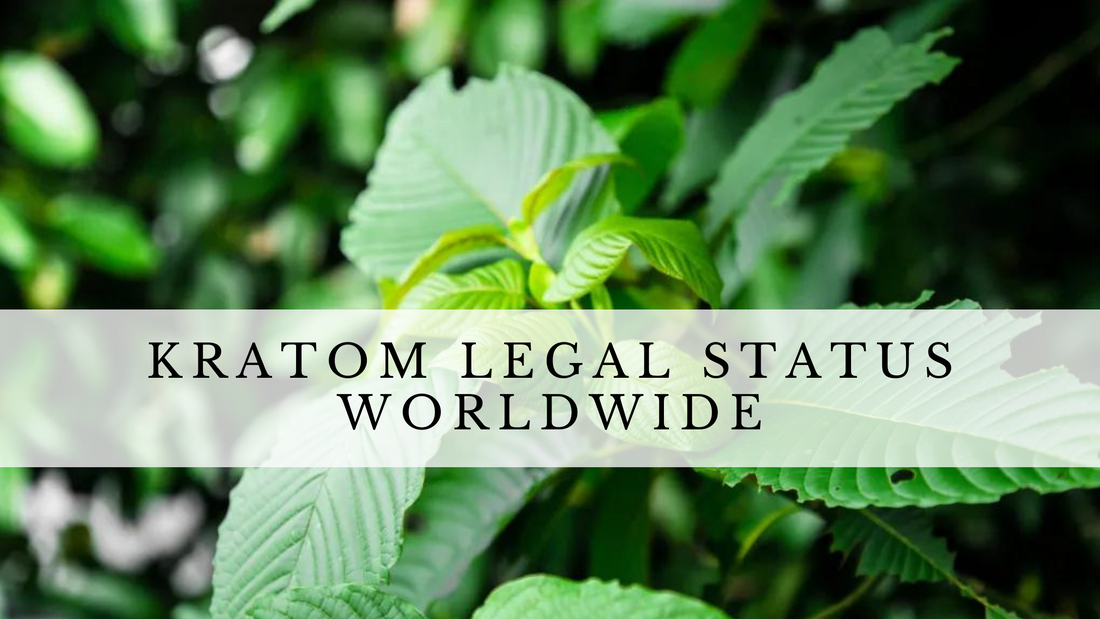Kratom, a plant belonging to the coffee family, is predominantly cultivated in Southeast Asian countries such as Indonesia, Malaysia, and Thailand. Over the years, Kratom has become an incredibly popular product, widely used across the globe.
In recent years, Kratom's efficacy has been officially recognized, leading to its legalization in countries like Thailand as a traditional medicine. Some U.S. states have enacted the "Kratom Consumer Protection Act" and a recent assessment by the WHO on "Substance Dependence" has confirmed Kratom's pharmacological properties for both self-treatment and traditional medicine. However, the WHO also concluded that there is insufficient evidence to make a definitive judgment about Kratom's classification as a controlled substance.
In this article, we will explore the legal status of Kratom worldwide.
Legal status of kratom in various countries
Europe
Kratom is currently legal in the following European Union countries:
- Albania
- Austria
- Belgium
- Bosnia
- Croatia
- Czech Republic
- Germany
- Greece
- Hungary
- Kosovo
- Malta
- Montenegro
- Netherlands
- North Macedonia
- Spain
- Ukraine
While Kratom has shown promise for therapeutic use, there is still a lack of comprehensive regulations for consumers in Europe.
To understand GOOD BUDS®' shipping policies regarding Kratom products in Europe, you can visit their website.

Picture: https://eka.eu/legality/
United States
In the United States, the use of Kratom is not officially recognized, and regulations vary from state to state. Some states permit its use but with strict controls, while others completely ban it. Currently, the FDA is conducting research on the health effects of Kratom and its legal status.
Here's a state-by-state breakdown:
Legal
- Alaska
- Arizona (with the Kratom Consumer Protection Act)
- California (except for San Diego)
- Connecticut
- Delaware
- Hawaii
- Idaho
- Illinois (for individuals aged 18 and above, except in Jerseyville)
- Iowa
- Kansas
- Kentucky
- Louisiana
- Maine
- Maryland
- Massachusetts
- Michigan
- Minnesota
- Mississippi (except Union County)
- Missouri
- Montana
- Nebraska
- Nevada (with the Kratom Consumer Protection Act)
- New Hampshire (for individuals aged 18 and above, except in Franklin)
- New Jersey
- New Mexico
- New York
- North Carolina (for individuals aged 18 and above)
- North Dakota
- Ohio
- Oklahoma
- Oregon (for individuals aged 21 and above)
- Pennsylvania
- South Carolina
- South Dakota (for individuals aged 21 and above)
- Tennessee (for individuals aged 21 and above)
- Texas
- Utah (with the Kratom Consumer Protection Act)
- Virginia
- Washington
- West Virginia
- Wisconsin

Illegal
- Alabama
- Arkansas
- Indiana
- Rhode Island
- Vermont
- Wyoming
For the latest updates on Kratom's legal status in your state, it's advisable to check with local authorities.
Asia
In Asia, Kratom use is permitted in some countries like Indonesia, Malaysia, and Thailand, while others have banned it entirely. However, regulations surrounding Kratom use are not well-defined, and user safety is not guaranteed.
Where is kratom banned?
Kratom is banned in several U.S. states, counties, and cities. It is also banned in several countries, including:
- Australia
- Finland
- Denmark
- Japan
- Israel
- Malaysia
- Lithuania
- Latvia
- Myanmar
- Russia
- Poland
- Romania
- South Korea
- Singapore
- New Zealand (without a medical prescription)
While some countries have regulations related to Kratom, these regulations are becoming more positive as the herbal remedy gains popularity.
Further research about kratom:
Despite receiving praise from Kratom users, most medical professionals and researchers suggest the need for clinical trials to precisely determine the harmful effects and benefits of this botanical substance. They also recommend stringent monitoring of Kratom businesses to ensure consumers receive high-quality products without compromising their health.
The American Medical Association proposed to the DEA last year that the active ingredients in Kratom, mitragynine and 7-hydroxymitragynine, should be legal for research into pain relief and addiction treatment.
Oliver Grundmann, a pharmacology professor at the University of Florida's College of Pharmacy, conducted surveys among Kratom users and found that very few reported addiction. Most used it to manage chronic pain, psychological conditions, or to overcome addiction to other substances.
"I'm asking the question of whether we're doing more harm by banning Kratom," Grundmann said.
If states and federal governments ban Kratom, he believes it not only slows down research but also limits options for Kratom users, potentially pushing them back to using painkillers or even heroin.
Soure:
- Grundmann, O., Hendrickson, R. G., & Greenberg, M. I. (2022). Kratom: History, pharmacology, current user trends, adverse health effects and potential benefits. Disease-a-Month. doi:10.1016/j.disamonth.2022.101442.
Conclusion
Kratom has a rich history in Southeast Asian countries and has recently gained popularity in Europe and the United States for its stimulating and opioid-like effects. This plant has complex pharmacological interactions and can pose health risks when used excessively or without control. However, it also has several useful applications, including pain relief, anxiety management, depression alleviation, and addiction symptom mitigation. Therefore, governments aim to regulate it for the safety of users.
Users must be aware of the laws in their respective countries and thoroughly research product quality and safety before using Kratom.

